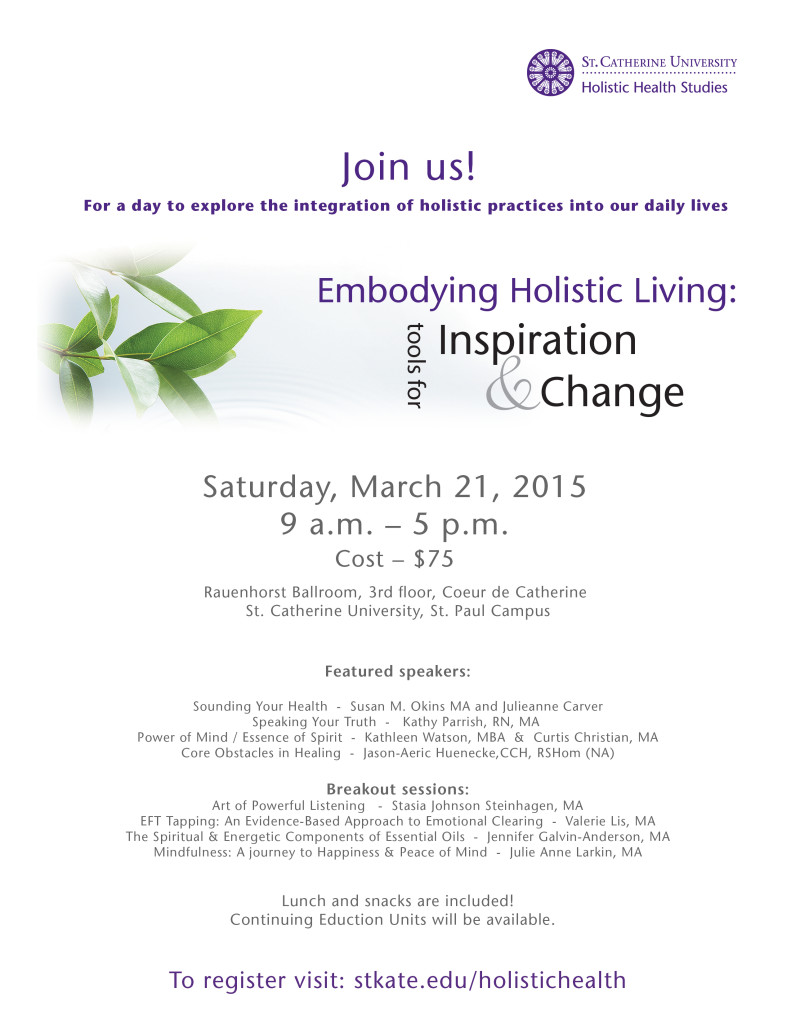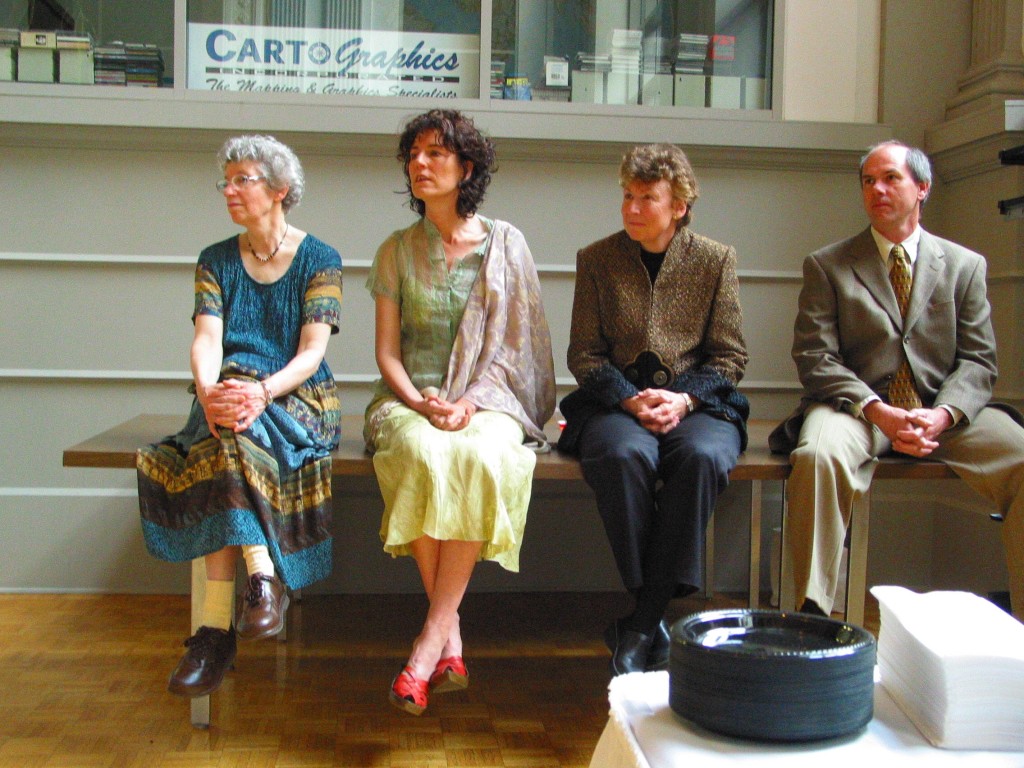St. Catherine University Embodying Holistic Living Conference
Keynote Speech presented on 21 March 2015 in Saint Paul, Minnesota
Hello my name is Jason-Aeric Huenecke, I am a Classical Homeopathic Practitioner, Spiritual Guide, and a graduate from St. Catherine’s Certificate program in Holistic Health Studies (2000). In my work, I help people to harness resilience through resonance, homeopathic resonance.
Today, I will be discussing the homeopathic concept of Obstacles to Cure, a term used to indicate anything in the patient’s lifestyle that may disturb or extinguish the action of a homeopathic remedy. Even the best homeopathic remedy is limited in its capacity to help someone if she is eating junk food, not exercising, drinking too much alcohol or taking drugs. Obstacles to cure can include environmental influences—for example, someone with a chronic cough may have mold in the house and cannot get better until the mold is removed. Obstacles can also include the emotional environment. For example, we have wonderful homeopathic remedies for the emotional trauma caused by an abusive relationship, but as long as the victim stays in the relationship, there is only so much the remedy can do.
Here at the Embodying Holistic Living conference, with so many of you doing wonderful work with a variety of holistic modalities, I want to expand these notions to include certain mindsets that anyone providing holistic or complementary treatments will undoubtedly encounter. Patients with chronic illness come to us after arduous and lengthy illness experiences, often having gone to many other practitioners, and often feeling discouraged, disappointed, and demanding to be healed.
The first obstacle to cure is the diagnostic label and the mistaken belief that “I am my diagnosis”.
When a doctor diagnoses someone as incurable, I have observed that people tend to give up, because of cultural beliefs that “the doctor knows best”. People have been taught from birth on to put more faith into their doctor’s diagnosis than their own sense of their body, and more faith in the doctor’s prognosis than their own multidimensional ways to heal: mentally-emotionally, physically, and of primarily spiritually. This is especially obvious when someone receives the diagnosis of cancer. They immediately turn into a cancer patient, losing energy and losing hope, even if the diagnosis later turns out to be false.
The weight of the doctor’s word in conventional medicine is considered non-negotiable. This is not meant to be a put down on a doctor; this is just a different paradigm.
The second obstacle to cure is overdiagnosis versus individualized medicine.
Overdiagnostic categories abound in both allopathic and holistic health field. Today it isn’t uncommon that people are told that they are ill because of adrenal exhaustion, chronic fatigue, candida, dairy, wheat, gluten, night-shades, and/or sugar sensitivity. While this very well may be true, in homeopathic medicine, it is essential to understand what each individual is genuinely sensitive to rather than the practitioner imposing her or his belief system onto the patient. In homeopathy we often have patients coming who have been diagnosed as allergic to dozens of different substances yet who can eat these substances with no apparent reaction. Patient, know thyself!
The homeopathic practitioner receives the case of the patient over an hour and a half to three hours, listening to the idiosyncratic symptomatology of the individual, while often wading through pages of overdiagnoses, to get to the heart of what needs to be cured.
The third obstacle to cure is overdependence on a practitioner.
Some practitioners consciously or unconsciously encourage dependence. A healthy holistic practitioner understands that each individual has an innate capacity to heal, and that healing is not dependent upon the practitioner, instead it is based on holding the space for the individual’s Vital Force to grow stronger and more resilient with a well chosen treatment.
Some practitioners, when their treatment fails, fall back upon the notion that “you created your illness” or hold the belief that “the sick individual does not want to get well.” Instead, the practitioner needs to step back and explore with the individual what it will mean if she or he does not heal or what it would be like if she or he was completely healed.
The fourth obstacle to cure: Too many modalities and practitioners!?
Even though our patients tend to distrust doctors, they tend to rely on multiple holistic modalities and practitioners simultaneously. This is a problem because it leaves each practitioner wondering what is doing what? It isn’t uncommon that a patient new to homeopathy will give a long list of holistic practitioners; a chiropractor, cranial-sacral practitioner, massage therapist, acupuncturist, osteopath, naturopath, shamanic practitioner and/or psychotherapist. Homeopaths commonly ask patients to refrain from other treatments for six to nine months while beginning their homeopathic treatment, so that a clear, unaltered symptom picture can emerge. Many people are unwilling to do this and homeopathy can help them nevertheless, although the healing journey may be slower.
Another problem with patients seeing multiple practitioners at once: the healing crisis in one modality can be misperceived and incorrectly treated in another modality. For example, the healing process in homeopathy can include what we call a return of old symptoms, a very temporary revisiting of a previous illness as the body is clearing it for good; or an aggravation, a temporary worsening of the presenting symptoms, as part of an overall improvement. If the homeopathic process causes a clearing in the form of diarrhea or a rash or a mucus discharge and one of the patient’s other practitioners forces that symptom to disappear, it can cause a real setback in the homeopathic healing process.
Also, while many modalities claim to be holistic, the approach used by the practitioner is allopathic rather than homeopathic. A homeopathic approach covers the largest totality of symptoms and in Classical Homeopathy this means one remedy at a time.
The fifth obstacle to cure: The patient’s belief that I cannot get well: “I created my illness”.
An unfortunate result of the widespread belief that “you create your own reality” is the belief that if you are sick, it’s because you created the illness with your thoughts. That may be true to some extent, but it does not take into account the many environmental influences in our toxic world. Worse, it adds a burden of guilt to someone who is already struggling with illness. It can also add a kind of obsessive-compulsive self-scrutiny as the person believes “if only I hadn’t eaten that,” or “if only I hadn’t had that thought,” or “if I could’ve had different parents (or life circumstances),” or even “I did everything right and I am still suffering.”
Throughout the world there are many wild views of what illness is, sometimes it is considered karmic, sometimes demonic possession, sometimes as a punishment of a deity due to lack of faith or some sin. The homeopathic practitioner explores in painstaking detail what a person’s illness means to her or him. Homeopathic patients that they have never felt so unconditionally listened to often report it.
A final, sixth obstacle to cure: the dominant patriarchal and allopathic paradigm.
Patriarchy does not support health freedoms, the ability of the individual to choose the course of her or his treatments, especially with regard to children. The patriarchal system is based on hierarchical uses of power, on scientism as authority, the insurance company or doctor as authority, and control and domination of others through the dominant paradigm. Currently, alternative and complementary practitioners can see this with the allopathic hospital systems and their push-pull of wanting to practice holistically and yet on the other hand unable to justify the resources, patient contact hours for the treatments, the holistically trained nurse, and the reimbursement of the time of that nurse.
I say scientism as opposed to science, meaning the belief in the current scientific paradigm in spite of numerous research studies supporting the newly emerging paradigm of holistic healthcare. Yet research grants are rarely or sparingly offered for only a narrow range of alternative and complimentary methods. They are almost never offered for homeopathy, in fact the researcher exploring homeopathy risks being censored or shunned.
The homeopathic practitioner regularly hears, when our patients are restored to health by the well-chosen remedy, that the presiding doctor states, “1) You must have been misdiagnosed, 2) it was spontaneous remission, or 3) there is no explanation for your recovery.”
Due to the constraints of the patriarchal system, the holistic intervention is not acknowledged or considered in the allopathic treatment plan. This is a patriarch form of entitlement, ownership over what is true in medicine, the belief that allopathy is true while complementary medicine is magical thinking or at best a form of placebo. The alternative and complementary practitioner is held in a subordinate or non-existent role in this system of one-size-fits-all symptom suppression.
Reframing our thinking and being: ways to turn obstacles into opportunities for healing and recovery of each individual.
- Helping our patients understand that a diagnosis is not something rigid and final; it is something fluid and flexible, it is something that can be changed.
- Creating relational practices that are respectful and collaborative. Remember that people hear from doctors, “There is nothing wrong with you. Your lab tests are all normal,” when they are in chronic pain and clearly suffering. We must listen to their subjective experience of their pain and take it seriously.
- Teaching our patients to be keen observers of their own symptomatology, knowing their own hearts, minds, and bodies, in their own experiences, and also in their own cure. Our role is that of health and vitality advocate, not the role of the ultimate expert. That said, we are still knowledgeable about our modalities transmitting our information and treatments with confidence, and we listen respectfully if the patient says the treatment is not working.
- Educating our patients if their response to the treatment “doesn’t look like what healing is supposed to look like”, in homeopathy there are at times aggravations followed by amelioration of symptoms.
- Understanding that the limitations imposed by insurance companies and doctors do not mean that the patient has no other options.
- Learning the limits of our modality and be willing to refer to respected colleagues when necessary.
- Serving as courageous holistic practitioners as our patients are healing and understand that healing takes its own time and does not always make sense.
- While it is true that our thoughts create our illness to some extent, we must never allow our patients to wallow in regrets or self-blame for the past, but teach them to look to the future with confidence in their power to change their physical reality by changing their core beliefs and strengthening their Inner Light.
- Cultivating patience and loving-kindness for those in the dominant paradigm who are slow to come around to what their mothers have been telling them for a very long time.
- Fortifying ourselves in the wisdom of the ancient traditions that have informed our holistic practices and honoring the women and men who have given us a wider perspective on what it means to practice the healing arts and science from a heart-centered and person-centered approach.
Many blessings and be loved.


